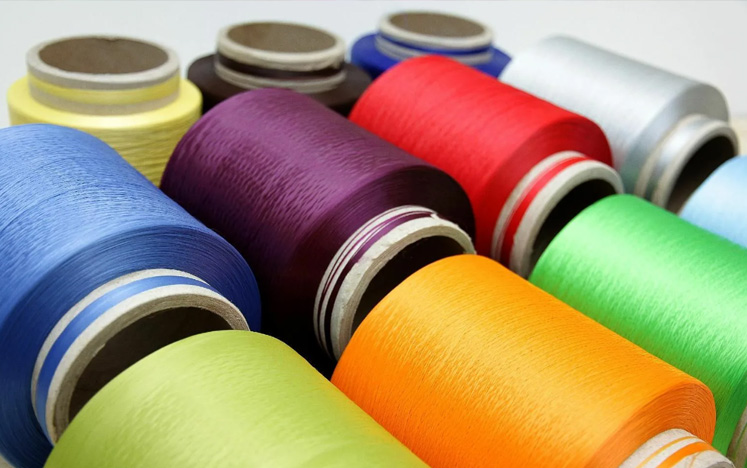If you are interested in some of our products, please feel free to visit our website or contact us for detailed information.

Chemical fiber yarn is widely used in various industries due to its versatility and desirable properties. Here are some common applications of chemical fiber yarn in different industries:
1.Textile Industry: Chemical fiber yarn is extensively used in the textile industry for the production of fabrics, clothing, and home textiles. It can be spun into yarns of different thicknesses and used to create a wide range of fabrics such as polyester, nylon, acrylic, and spandex. These fabrics are utilized in garments, upholstery, bedding, curtains, carpets, and other textile products.
2.Automotive Industry: Chemical fiber yarn is used in the automotive industry for manufacturing automotive textiles. It is used in the production of seat covers, upholstery, carpets, headliners, and other interior components. Chemical fiber yarn offers durability, resistance to abrasion, and ease of maintenance, making it suitable for automotive applications.
Chemical fiber yarn, such as polyester or nylon, is used in the manufacturing of seat covers, upholstery, and carpeting in automobiles.
It is also employed in the production of airbags, safety belts, and headliner fabrics.
3.Geotextiles: Chemical fiber yarn is employed in the construction industry for geotextile applications. Geotextiles are permeable fabrics that are used to stabilize soil, control erosion, and improve drainage systems. Chemical fiber yarn is used to manufacture geotextiles that provide strength, filtration, separation, and reinforcement in various civil engineering projects like roads, embankments, retaining walls, and landfills.
Chemical fiber yarns, such as polypropylene or polyester, are used to produce geotextiles that prevent soil erosion, stabilize slopes, and provide drainage in civil engineering projects.
Geotextiles made from chemical fiber yarn can be found in road construction, retaining walls, landfills, and coastal protection systems.
4.Sports and Outdoor Equipment: Chemical fiber yarn is used in the production of sports and outdoor equipment. It is used to make ropes, cords, nets, and fabrics for items such as parachutes, tents, sails, sports apparel, and equipment like backpacks and sleeping bags. The strength, flexibility, and weather resistance of chemical fiber yarn make it suitable for these applications.
Chemical fiber yarns, like high-tenacity polyester or nylon, are used to manufacture ropes, cords, and nets for various sporting activities, rock climbing, and camping.
Fabrics made from chemical fiber yarns are used in the production of tents, sails, backpacks, and outdoor apparel for their strength, water resistance, and durability.
5.Medical and Healthcare: Chemical fiber yarn finds applications in the medical and healthcare industry. It is used to manufacture medical textiles, including surgical gowns, drapes, wound dressings, and bandages. Chemical fiber yarn offers properties like moisture management, antimicrobial properties, and ease of sterilization, which are important in medical settings.Chemical fiber yarns, such as polypropylene or polyester, are used in the production of surgical gowns, drapes, and wound dressings due to their moisture-wicking properties, breathability, and resistance to microbial growth.
Elasticized chemical fiber yarns are used in the production of bandages and compression garments for medical and therapeutic applications.
6.Industrial Applications: Chemical fiber yarn is used in various industrial applications such as filtration, insulation, conveyor belts, ropes, hoses, and safety equipment. The specific properties of chemical fiber yarn, such as heat resistance, chemical resistance, and high tensile strength, make it valuable in these industrial settings.
Chemical fiber yarns, such as aramid fibers (e.g., Kevlar), are used in the production of safety equipment like cut-resistant gloves, bulletproof vests, and protective clothing for industrial workers.
Chemical fiber yarns are utilized in the production of industrial filters, conveyor belts, hoses, and insulation materials due to their resistance to heat, chemicals, and mechanical stress.
As technology and innovation continue to advance, chemical fiber yarns will likely play an even more significant role, shaping the future of various industries and improving our everyday lives.
Chemical fiber yarn

Chemical fiber yarn, also known as synthetic or man-made fiber yarn, is a versatile and widely used material in the textile industry. It is created through chemical processes using various polymers and additives, resulting in fibers that closely resemble natural fibers such as cotton, wool, or silk. These fibers are then spun into yarns, which can be further processed into fabrics, garments, and a wide range of textile products.
As technology and innovation continue to advance, chemical fiber yarns will likely play an even more significant role, shaping the future of various industries and improving our everyday lives.
Chemical fiber yarn

Chemical fiber yarn, also known as synthetic or man-made fiber yarn, is a versatile and widely used material in the textile industry. It is created through chemical processes using various polymers and additives, resulting in fibers that closely resemble natural fibers such as cotton, wool, or silk. These fibers are then spun into yarns, which can be further processed into fabrics, garments, and a wide range of textile products.

 English
English Español
Español








